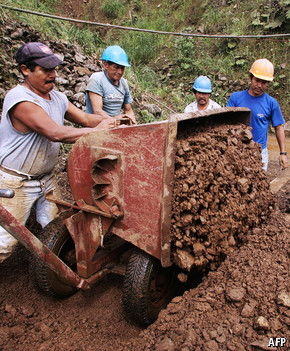Mining in Ecuador Going for gold As Brazil rai
Post# of 73
Mining in Ecuador
Going for gold
As Brazil raises its mining royalties, Ecuador cuts its own
Jun 22nd 2013 | QUITO | From the print edition

Timekeeper
Plenty of muck, but where’s the brass?
ECUADOREANS “live poorly amid incomparable riches”, Alexander von Humboldt is said to have noted on his 19th-century adventures. Fresh into his third presidential term, Rafael Correa is aiming at last to unlock Ecuador’s underground wealth of gold, silver, copper and other metals. Populist policies pursued during his first six years in office alienated mining companies and environmentalists alike. But a new mining law passed on June 13th suggests a more pragmatic tack.
A comprehensive mining reform in 2009 wrapped companies in red tape and clobbered them with taxes. The government touted its mining regime as the most lucrative for the state anywhere in the world. Investors took note and went elsewhere. With February’s presidential election out of the way, Mr Correa has changed course. The new law imposes an 8% ceiling on previously open-ended royalties, and streamlines the permits required. Companies won’t pay windfall taxes until they have recouped their investments.
In this section
Taking to the streets
Time to dig deep
Going for gold
A new menu
Reprints
Related topics
Rafael Correa
Ecuador
The push to woo foreign investors is overdue. In 2012 Ecuador received less foreign direct investment per person than any other country in Latin America, according to the UN. In April Mr Correa announced that he wanted Ecuador to join a free-trade agreement with the European Union that Colombia and Peru have already signed, combined with an investment-guarantee treaty. The government has also indicated that it is planning to return to the international debt market, five years after it defaulted on $3.2 billion of sovereign bonds.
The new-found pragmatism irks some in the cabinet. Left-wingers such as Fander Falconí, the planning minister, would prefer Ecuador to join Mercosur, a customs union of more statist countries. Environmentalists and indigenous groups worry that the more liberal mining regime will lead to overdevelopment and pollution (the new law prohibits the use of mercury, but not cyanide).
The mining law should help start small and midsized operations, but the big deposits may remain elusive. Canada’s Kinross, one of the world’s biggest gold companies, gave up negotiations with the government on June 10th, preferring to write down $720m. “They are going because the profits they expect are not enough for their shareholders,” said Pedro Merizalde, the recently appointed minister for natural resources. Unless Mr Correa can convince investors that his new pragmatism is genuine, some of Ecuador’s mineral riches will stay trapped in the ground.
 (0)
(0) (0)
(0)